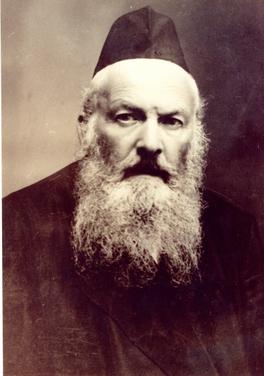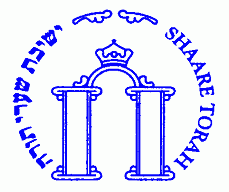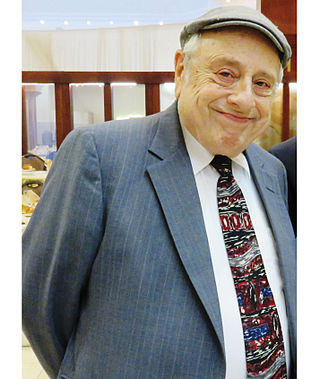
A yeshiva, jeshibah is a traditional Jewish educational institution focused on the study of Rabbinic literature, primarily the Talmud and halacha, while Torah and Jewish philosophy are studied in parallel. The studying is usually done through daily shiurim as well as in study pairs called chavrusas. Chavrusa-style learning is one of the unique features of the yeshiva.

Ner Israel Rabbinical College, also known as NIRC and Ner Yisroel, is a Haredi yeshiva in Pikesville, Maryland. It was founded in 1933 by Rabbi Yaakov Yitzchok Ruderman, a disciple of Rabbi Nosson Tzvi Finkel, dean of the Slabodka yeshiva in Lithuania. Rabbi Aharon Feldman, a disciple of Rabbi Ruderman and a member of the Moetzes Gedolei HaTorah of America, became its head in 2001.

Yeshivas Chofetz Chaim is an Orthodox yeshiva based in Kew Gardens Hills, Queens, New York, United States. It is primarily an American, non-chasidic Haredi Talmudic yeshiva. The yeshiva is legally titled Rabbinical Seminary of America (RSA) but is often referred to as just Chofetz Chaim as that was the nickname of its namesake, Yisroel Meir Kagan. It has affiliate branches in Israel and North America.

Telshe Yeshiva is a yeshiva in Wickliffe, Ohio, formerly located in Telšiai, Lithuania. During World War II the yeshiva began relocating to Wickliffe, Ohio, in the United States and is now known as the Rabbinical College of Telshe, commonly referred to as Telz Yeshiva, or Telz in short.

Yeshiva Torah Vodaas is a yeshiva in the Flatbush neighborhood of Brooklyn, New York.
Midrasha is a Hebrew term currently used for three types of educational institutions:
- Torah study institutions for women of post-high-school age. Also called "seminaries".
- Informal education colleges and institutions.
- Israeli field schools focused on nature and ecology who hold seminars and organize field trips.
Rabbi Isaac Elchanan Theological Seminary is the rabbinical seminary of Yeshiva University (YU). It is located along Amsterdam Avenue in the Washington Heights neighborhood of Manhattan, New York City.

Tomchei Tmimim is the central Yeshiva of the Chabad-Lubavitch Hasidic movement. Founded in 1897 in the town of Lubavitch by Rabbi Sholom Dovber Schneersohn, it is now an international network of institutions of advanced Torah study, the United Lubavitcher Yeshivoth.

Elchonon Bunim Wasserman was a prominent rabbi and rosh yeshiva (dean) in prewar Europe. He was one of the closest students of Yisrael Meir Kagan and a noted Talmid Chacham. In the interwar period, he served as rosh yeshiva of Yeshiva Ohel Torah-Baranovich. He was murdered during the Holocaust.

Shimon Yehuda Shkop was Rosh Yeshiva (dean) of the Yeshiva of Telshe, and later of Yeshiva Shaar HaTorah of Grodno. Having innovated a style of Torah study, applying both to Halacha and to Talmud, he was widely regarded as a major Talmid Chacham.
Gateshead Talmudical College, popularly known as Gateshead Yeshiva, is located in the Bensham area of Gateshead in North East England. It is the largest yeshiva in Europe and considered to be one of the most prestigious advanced yeshivas in the Orthodox world. The student body currently numbers approx. 350. Although students are mainly British, there are European, American, Canadians as well as some from South America, Australia and South Africa.

Yeshivat Shaare Torah is a 501(c)(3) non-profit organization that operates five Sephardic private Jewish day school programs located in Brooklyn, New York, United States. It includes single-gender elementary schools and high schools for boys and girls. The boys' high school has 309 students and the girls' high school has 120 students. The organization also operates a preschool program for 60 children.
Zevulun Charlop was an American rabbi, who served as dean of Rabbi Isaac Elchanan Theological Seminary (RIETS), an affiliate of Yeshiva University (YU). He was also president of several major Jewish organizations, in the United States and Israel.

Yeshivas Knesses Yisrael was a yeshiva located in the town of Sloboda Vilyampolskaya in the Kovno Governorate of Russian Empire. It functioned from the late 19th century until World War II.

Yitzhak Frank is an Israeli rabbi and a teacher of Talmud in Israel. He has made 11 publications between 1991 and 2001. His works are used as teaching material for Talmud students and rabbis in the Jewish schools in Israel. His book The practical Talmud dictionary has won the Prize of the Israeli Minister of Education.
Yosef Yitzchak "Yossi" Jacobson, also known as YY Jacobson, is an American Chabad rabbi and speaker from Monsey, New York.












